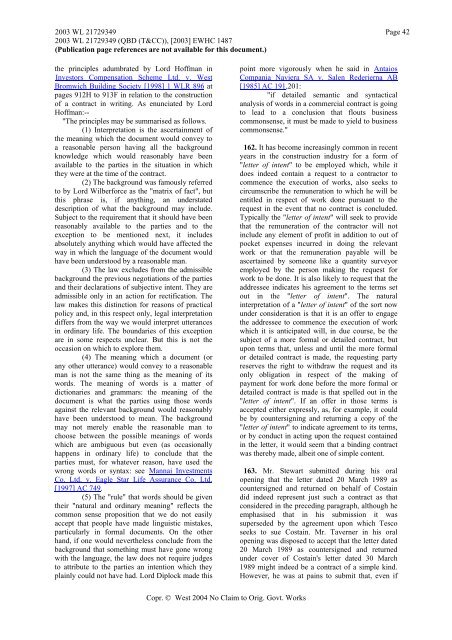Tesco v Constain - Thomson Reuters
Tesco v Constain - Thomson Reuters
Tesco v Constain - Thomson Reuters
You also want an ePaper? Increase the reach of your titles
YUMPU automatically turns print PDFs into web optimized ePapers that Google loves.
2003 WL 21729349 Page 422003 WL 21729349 (QBD (T&CC)), [2003] EWHC 1487(Publication page references are not available for this document.)the principles adumbrated by Lord Hoffman inHInvestors Compensation Scheme Ltd. v. WestBromwich Building Society [1998] 1 WLR 896 atpages 912H to 913F in relation to the constructionof a contract in writing. As enunciated by LordHoffman:--"The principles may be summarised as follows.(1) Interpretation is the ascertainment ofthe meaning which the document would convey toa reasonable person having all the backgroundknowledge which would reasonably have beenavailable to the parties in the situation in whichthey were at the time of the contract.(2) The background was famously referredto by Lord Wilberforce as the "matrix of fact", butthis phrase is, if anything, an understateddescription of what the background may include.Subject to the requirement that it should have beenreasonably available to the parties and to theexception to be mentioned next, it includesabsolutely anything which would have affected theway in which the language of the document wouldhave been understood by a reasonable man.(3) The law excludes from the admissiblebackground the previous negotiations of the partiesand their declarations of subjective intent. They areadmissible only in an action for rectification. Thelaw makes this distinction for reasons of practicalpolicy and, in this respect only, legal interpretationdiffers from the way we would interpret utterancesin ordinary life. The boundaries of this exceptionare in some respects unclear. But this is not theoccasion on which to explore them.(4) The meaning which a document (orany other utterance) would convey to a reasonableman is not the same thing as the meaning of itswords. The meaning of words is a matter ofdictionaries and grammars: the meaning of thedocument is what the parties using those wordsagainst the relevant background would reasonablyhave been understood to mean. The backgroundmay not merely enable the reasonable man tochoose between the possible meanings of wordswhich are ambiguous but even (as occasionallyhappens in ordinary life) to conclude that theparties must, for whatever reason, have used thewrong words or syntax: see HMannai InvestmentsCo. Ltd. v. Eagle Star Life Assurance Co. Ltd.[1997] AC 749.(5) The "rule" that words should be giventheir "natural and ordinary meaning" reflects thecommon sense proposition that we do not easilyaccept that people have made linguistic mistakes,particularly in formal documents. On the otherhand, if one would nevertheless conclude from thebackground that something must have gone wrongwith the language, the law does not require judgesto attribute to the parties an intention which theyplainly could not have had. Lord Diplock made thispoint more vigorously when he said in HAntaiosCompania Naviera SA v. Salen Rederierna AB[1985] AC 191,201:"if detailed semantic and syntacticalanalysis of words in a commercial contract is goingto lead to a conclusion that flouts businesscommonsense, it must be made to yield to businesscommonsense."162. It has become increasingly common in recentyears in the construction industry for a form of"letter of intent" to be employed which, while itdoes indeed contain a request to a contractor tocommence the execution of works, also seeks tocircumscribe the remuneration to which he will beentitled in respect of work done pursuant to therequest in the event that no contract is concluded.Typically the "letter of intent" will seek to providethat the remuneration of the contractor will notinclude any element of profit in addition to out ofpocket expenses incurred in doing the relevantwork or that the remuneration payable will beascertained by someone like a quantity surveyoremployed by the person making the request forwork to be done. It is also likely to request that theaddressee indicates his agreement to the terms setout in the "letter of intent". The naturalinterpretation of a "letter of intent" of the sort nowunder consideration is that it is an offer to engagethe addressee to commence the execution of workwhich it is anticipated will, in due course, be thesubject of a more formal or detailed contract, butupon terms that, unless and until the more formalor detailed contract is made, the requesting partyreserves the right to withdraw the request and itsonly obligation in respect of the making ofpayment for work done before the more formal ordetailed contract is made is that spelled out in the"letter of intent". If an offer in those terms isaccepted either expressly, as, for example, it couldbe by countersigning and returning a copy of the"letter of intent" to indicate agreement to its terms,or by conduct in acting upon the request containedin the letter, it would seem that a binding contractwas thereby made, albeit one of simple content.163. Mr. Stewart submitted during his oralopening that the letter dated 20 March 1989 ascountersigned and returned on behalf of Costaindid indeed represent just such a contract as thatconsidered in the preceding paragraph, although heemphasised that in his submission it wassuperseded by the agreement upon which <strong>Tesco</strong>seeks to sue Costain. Mr. Taverner in his oralopening was disposed to accept that the letter dated20 March 1989 as countersigned and returnedunder cover of Costain's letter dated 30 March1989 might indeed be a contract of a simple kind.However, he was at pains to submit that, even ifCopr. © West 2004 No Claim to Orig. Govt. Works
















